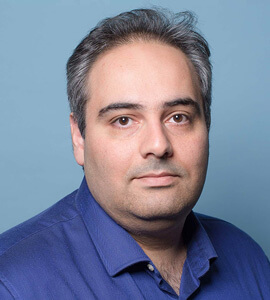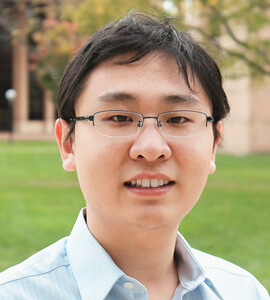Award Information
Established in 2019, this award will recognize and honor SSCS members in their early career who are exploring innovative and visionary technical work within the field of solid-state circuits. The award aims to emphasize pioneering developments that are at the frontiers of IC design or possess an imminent potential to expand the field through new categories of circuit technologies, system design, and/or emerging applications.
Those who receive this award must be a current SSCS Member in good standing and have received their highest degree (Bachelor or Higher) within ten years of the Award’s application deadline.
One award will be given annually, but only if a suitable awardee is identified. The award’s cash prize may be split among multiple recipients. The winner of this award will receive a plaque and honorarium of $5,000.
The call for nominations will be made in our primary SSCS member communications, the Solid-State Circuits Magazine and Society Newsletter. The nomination package will consist of: (1) a one to two-page description of the candidate’s current contributions and vision of how the candidate’s research and development work will advance the field of solid-state circuits; (2) a list of publications or patents to support the nomination; (3) a maximum of three letters of recommendation from people familiar with the candidate’s work.
The Award selection process will be managed by the SSCS Awards Committee, which consists of an appointed Chair, who will select additional members of the Committee or appoint sub-committees as needed.
Award nominations will be accepted during the year prior to the year the award is presented.
The SSCS Awards Committee or its appointed sub-committee shall evaluate nominations as to whether the nominee’s contribution is significant and merits consideration. A slate of selected nominees will be presented by the Awards Chair to the SSCS Administrative Committee and the winner will be selected by the SSCS Administrative Committee by vote.
This award will be presented at the plenary session of one of the SSCS financially sponsored conferences, at the choice of the recipient.
Announcement of the Award winner will appear in the Solid-State Circuits Magazine, SSCS Newsletter, and SSCS Website.
Submission Instructions
A platform called OpenWater is required to upload nomination packages. For detailed instructions on how to use the OpenWater platform, click here.
The following materials must be uploaded as part of the nomination package:
- A one to two-page description of the candidate’s current contributions and the vision of his or her research and development and how it will advance the field of solid-state circuits (PDF only, 25 MB Max)
- A list of the candidate’s publications or patents to support this nomination (PDF only, 25 MB Max)
In addition, letters of recommendation must be submitted (maximum of three letters, PDF only, 25 MB Max). The nominator will submit names of those providing a letter of recommendation in the OpenWater system, and then the OpenWater system will send an email to those people asking them to upload their letter of recommendation.
This year’s application window is from 8/1/2024 at 12:00 AM to 10/15/2024 at 11:59 PM (UTC-05:00, UTC-04:00 Daylight.) If you have any questions, please use the form here.
2025 IEEE Solid-State Circuits Society New Frontier Award Winner
Masoud Babaie received his B.Sc. (Hons.) in Electrical Engineering from Amirkabir University of Technology, Tehran, Iran, and his M.Sc. degree from Sharif University of Technology, Tehran, Iran, in 2004 and 2006, respectively. From 2006 to 2011, he worked at the Kavoshcom Research and Development Group in Tehran, Iran, designing wireless communication systems. In 2016, he received the Ph.D. degree (cum laude) in Electrical Engineering from Delft University of Technology, Delft, The Netherlands, with a dissertation titled “Power Efficient RF/mm-wave Oscillators and Power Amplifiers for Wireless Applications.” The same year, he joined Delft University of Technology, where he is currently an Associate Professor.
He leads a research group dedicated to designing advanced mixed-signal, RF, and millimeter-wave integrated circuits and systems for wireless communications, along with cryogenic electronic interfaces for quantum computing. His primary research interests also include developing critical components such as voltage-controlled oscillators, power amplifiers, frequency synthesizers, and transceivers—essential for advancing next-generation technologies in wireless communication and quantum computing applications.
Since 2021, Dr. Babaie has served on the Technical Program Committee of the IEEE International Solid-State Circuits Conference (ISSCC), where he serves as the 2025 RF Subcommittee Interim Vice-Chair. He has been Co-Chair of the Emerging Computing Devices and Circuits Subcommittee of the IEEE European Solid-State Electronics Research Conference (ESSERC) since 2022. He is also an Associate Editor for IEEE Solid-State Circuits Letters (SSC-L).
Dr. Babaie has authored or coauthored one book, three book chapters, 11 patents, and over 100 peer-reviewed technical papers. His work has been recognized with several awards, including the 2015–2016 IEEE Solid-State Circuits Society Pre-Doctoral Achievement Award, the 2019 IEEE ISSCC Demonstration Session Certificate of Recognition, the 2020 IEEE ISSCC Jan Van Vessem Award for Outstanding European Paper, the 2022 IEEE CICC Best Paper Award, and the 2023 IEEE IMS Best Student Paper Award (second place). In 2019, he was awarded a Veni grant from the Netherlands Organization for Scientific Research (NWO).

Masoud Babaie
Kaiyuan Yang is an Associate Professor of Electrical and Computer Engineering at Rice University, USA, where he leads the Secure and Intelligent Micro-Systems (SIMS) lab. He received a B.S. degree in Electronic Engineering from Tsinghua University, China, in 2012, and a Ph.D. degree in Electrical Engineering from the University of Michigan – Ann Arbor, MI, in 2017. His research focuses on low-power analog, digital, and mixed-signal integrated circuits and system design for bioelectronics, hardware security, and mixed-signal/in-memory computing.
Dr. Yang is a recipient of the National Science Foundation CAREER Award, the IEEE Solid-State Circuits Society (SSCS) Predoctoral Achievement Award, and best paper awards from premier conferences in multiple fields, including 2024 Annual International Conference of the IEEE Engineering in Medicine and Biology Society (EMBC), 2022 ACM Annual International Conference on Mobile Computing and Networking (MobiCom), 2021 IEEE Custom Integrated Circuit Conference (CICC), 2016 IEEE International Symposium on Security and Privacy (S&P), and 2015 IEEE International Symposium on Circuits and Systems (ISCAS), and several best paper nominations. His research was recognized as the research highlights of Communications of ACM (CACM), ACM GetMobile, and IEEE Top Picks in Hardware and Embedded Security. He is currently serving as an associate editor of IEEE Transactions on VLSI Systems (TVLSI), a program committee member of ISSCC, CICC, and ISCA conferences, and a member of SSCS Solid-State Circuits Directions committee.
Kaiyuan Yang’s research focuses on developing low-power digital, analog, and mixed-sign integrated circuits and micro-systems to enable ubiquitous sensing, edge computing, and bioelectronic applications that are not possible without miniaturized electronics powered by tiny batteries or even battery-free solutions. His lab explores and prototypes technologies for power transfer and management, wireless communication within human body, data and system security, and signal processing under extreme energy, weight, and volume constraints. One of the key application targets of his research is ultra-miniaturized battery-free bioelectronic implants that possess advanced sensing and stimulation capabilities, are minimally invasive, and offer patient-specific therapies that are impossible with traditional pharmaceuticals. His research takes a holistic approach, seeking to break traditional design abstractions and co-design across bioengineering, electronics, wireless, security, and computer systems.

Kaiyuan Yang
Past Recipients
| Year | Recipient |
| 2024 | Taekwang Jang, ETH Zurich |
| 2023 | Ruonan Han, Massachusetts Institute of Technology |
| 2022 | Kaushik Sengupta, Princeton University |
| 2021 | Dr. Rikky Muller, University of California at Berkeley |
| 2020 | Professor Nan Sun, University of Texas, Austin |



